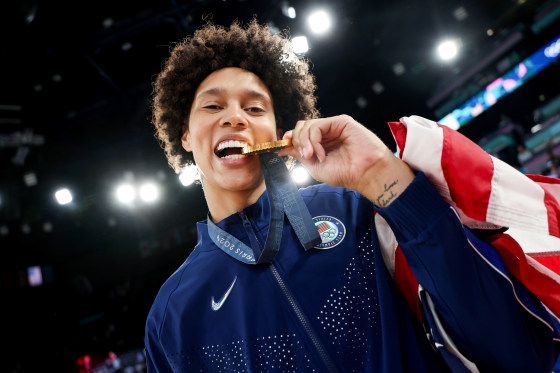CELEBRITY
Brittney Griner ‘screams’ after Kid Rock bluntly criticizes: ‘If you don’t respect America, you don’t deserve to represent this place’

In recent weeks, a fiery exchange between professional basketball player Brittney Griner and musician Kid Rock has captured widespread attention, stirring up a significant amount of debate about national pride, personal expression, and the intersection of sports and politics. Kid Rock, known for his brash and outspoken persona, ignited controversy with blunt remarks about Griner, leading to a passionate response from the athlete. The clash underscores deeper societal issues regarding patriotism and individual rights.
Griner voiced her frustration and anger, emphasizing that her criticism of certain aspects of American society did not equate to a lack of respect for her country. She argued that true patriotism involves addressing and improving the nation’s flaws, not blindly supporting it without question.
The roots of this controversy can be traced back to Griner’s public statements on various social issues. Griner has been an outspoken critic of systemic racism and social inequalities, using her platform to advocate for change. Her stance has sometimes been met with resistance from those who believe that criticism of the country’s problems is tantamount to disloyalty. Kid Rock’s remarks tapped into this sentiment, suggesting that dissenting voices should not have a place in national representation.
The debate between Griner and Kid Rock highlights a broader cultural clash. On one side, there are those who argue that expressing dissatisfaction with one’s country is an essential part of being a patriotic citizen. They believe that acknowledging and working to address the country’s flaws is a way of showing love and commitment to the nation. On the other hand, critics of this view often argue that public figures should avoid criticizing the country and focus instead on positive representation.Griner’s response reflects a nuanced perspective on this issue. She asserts that her commitment to improving society and advocating for marginalized groups is rooted in a deep love for her country. Her approach emphasizes that respect for a nation involves engaging in critical conversations and pushing for progress, rather than accepting the status quo.This incident also touches on the larger question of the role of athletes and celebrities in political discourse. As public figures, athletes like Griner are often in the spotlight, and their views can significantly influence public opinion. The expectation that they should either conform to or challenge prevailing narratives adds another layer of complexity to their roles. Griner’s response demonstrates that her advocacy work is not just about personal beliefs but about using her platform to effect positive change.
In conclusion, the exchange between Brittney Griner and Kid Rock serves as a powerful reminder of the ongoing debate over what it means to truly respect one’s country. While Kid Rock’s comments reflect a traditional view of patriotism, Griner’s response highlights an alternative perspective that sees critical engagement as a form of deep-seated respect. This controversy underscores the need for open dialogue about national identity and the ways in which individuals and public figures navigate their roles within society.























